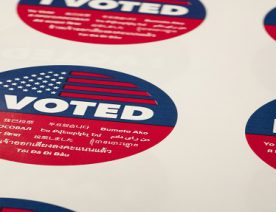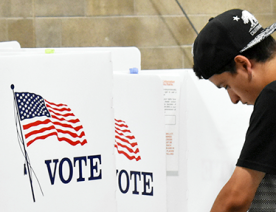
Young people who identify as Democrats are more engaged in the midterm elections this year than their Republican counterparts. According to the latest wave of the MTV/AP-NORC Youth Political Pulse survey of young people age 15-34, young Democrats are more inclined than young Republicans to consider their generation as motivated to make changes for the better, more prone to encourage friends to vote, and more likely to plan to vote themselves.
While overall only a third of young people age 18-34 expect to vote on November 6, 41 percent of young Democrats say they are certain to vote compared with 28 percent of young Republicans.
Fifty-four percent of young people say voting in November is very important, including 64 percent of young Democrats and 52 percent of young Republicans. Young Democrats are more apt than young Republicans to encourage a friend to vote: 46 percent compared with 37 percent of young Republicans.
The survey also finds that two-thirds of young people favor universal health care, tuition-free college education for all Americans, and an increased minimum wage. About 6 in 10 would like to see guaranteed employment, an end to government surveillance of private communications, and legalization of recreational use of marijuana. Only about 4 in 10 support reducing government regulation or repealing the income tax. In fact, most young people view government as a source for good in society. Fifty-eight percent regard the federal government as a protector of life and liberty; 39 percent consider the federal government as a threat. And most would like to see Washington do more to assist its disadvantaged citizens. Fifty-six percent think the government should do more to help needy Americans; 42 percent say it can’t afford to do anything more.
This survey is the fifth in a multiwave series that takes the political pulse of the newest generation of voters as the November 2018 midterm elections approach. This nationwide poll by MTV and The AP-NORC Center was conducted September 20-October 8, 2018, using AmeriSpeak®, the probability-based panel of NORC at the University of Chicago. It surveyed a total of 1,052 young people age 15-34.




